- Home
- Vasily Grossman
A Writer at War
A Writer at War Read online
A Writer at War
Vasily Grossman with the Red Army
1941–1945
EDITED AND TRANSLATED
BY
Antony Beevor
AND
Luba Vinogradova
THE HARVILL PRESS
LONDON
This eBook is copyright material and must not be copied, reproduced, transferred, distributed, leased, licensed or publicly performed or used in any way except as specifically permitted in writing by the publishers, as allowed under the terms and conditions under which it was purchased or as strictly permitted by applicable copyright law. Any unauthorised distribution or use of this text may be a direct infringement of the author’s and publisher’s rights and those responsible may be liable in law accordingly.
Version 1.0
Epub ISBN 9781407092010
www.randomhouse.co.uk
Published by The Harvill Press 2005
2 4 6 8 10 9 7 5 3 1
Copyright © Ekaterina Vasilievna Korotkova-Grossman and Elena Fedorovna Kozhichkina 2005
English translation, introduction, and commentary © Antony Beevor and Luba Vinogradova
The moral right of Vasily Grossman to be identified as the author of this work has been asserted under the Copyright, Designs and Patents Act 1988
This book is sold subject to the condition that it shall not, by way of trade or otherwise, be lent, resold, hired out, or otherwise circulated without the publisher’s prior consent in any form of binding or cover other than that in which it is published and without a similar condition including this condition being imposed on the subsequent purchaser
First published in Great Britain in 2005 by The Harvill Press Random House, 20 Vauxhall Bridge Road, London sw1v 2sa
Random House Australia (Pty) Limited 20 Alfred Street, Milsons Point, Sydney, New South Wales 2061, Australia
Random House New Zealand Limited 18 Poland Road, Glenfield, Auckland 10, New Zealand
Random House (Pty) Limited Endulini, 5A Jubilee Road, Parktown 2193, South Africa
The Random House Group Limited Reg. No. 954009 www.randomhouse.co.uk
A CIP catalogue record for this book is available from the British Library
ISBN 1 84343055 x
Papers used by Random House are natural, recyclable products made from wood grown in sustainable forests; the manufacturing processes conform to the environmental regulations of the country of origin
Designed by Peter Ward Maps by Paul Simmons
Typeset by Palimpsest Book Production Limited Printed and bound in Great Britain by Clays Ltd, St Ives plc
Contents
Cover
Title
Copyright
Also by Vasily Grossman in English
Introduction
Translators’ Note
Glossary
PART ONE
The Shock of Invasion 1941
1 Baptism of Fire August 1941
2 The Terrible Retreat August to September 1941
3 On the Bryansk Front September 1941
4 With the 50th Army September 1941
5 Back into the Ukraine September 1941
6 The German Capture of Orel October 1941
7 The Withdrawal before Moscow October 1941
PART TWO
The Year of Stalingrad 1942
8 In the South January 1942
9 The Air War in the South January 1942
10 On the Donets with the Black Division January and February 1942
11 With the Khasin Tank Brigade February 1942
12 ‘The Ruthless Truth of War’ March to July 1942
13 The Road to Stalingrad August 1942
14 The September Battles
15 The Stalingrad Academy Autumn 1942
16 The October Battles
17 The Tide Turned November 1942
PART THREE
Recovering the Occupied Territories 1943
18 After the Battle January 1943
19 Winning Back the Motherland The Early Spring of 1943
20 The Battle of Kursk July 1943
PART FOUR
From the Dnepr to the Vistula 1944
21 The Killing Ground of Berdichev January 1944
22 Across the Ukraine to Odessa March & April 1944
23 Operation Bagration June & July 1944
24 Treblinka July 1944
PART FIVE
Amid the Ruins of the Nazi World 1945
25 Warsaw and ód January 1945
26 Into the Lair of the Fascist Beast January 1945 Pozna and Schwerin
27 The Battle for Berlin April and May 1945
AFTERWORD
The Lies of Victory
Acknowledgements
Bibliography
Source Notes
Index
MAPS
Gomel and the Central Front, August 1941
In the Donbass, January to March 1942
Stalingrad, Autumn and Winter 1942
The Battle of Kursk, July 1943
Also by Vasily Grossman in English
LIFE AND FATE
FOREVER FLOWING
Introduction
Vasily Grossman’s place in the history of world literature is assured by his masterpiece Life and Fate, one of the greatest Russian novels of the twentieth century. Some critics even rate it more highly than Pasternak’s Doctor Zhivago or the novels of Solzhenitsyn.
This volume is based on his wartime notebooks, but also some essays which are all in the Russian State Archive for Literature and the Arts (RGALI). We have also included some letters in the possession of his daughter and step-son. The notebooks reveal a good deal of the raw material which he accumulated for his novels as well as his articles. Grossman, a special correspondent for the Red Army newspaper, Krasnaya Zvezda, or Red Star, proved to be the most perceptive and honest eyewitness of the Soviet frontlines between 1941 and 1945. He spent more than a thousand days at the front – nearly three out of the four years of war. The sharpness of his observation and the humanity of his understanding offer an invaluable lesson for any writer and historian.
Vasily Grossman was born in the Ukrainian town of Berdichev on 12 December 1905. Berdichev had one of the largest Jewish populations in central Europe and the Grossmans were part of its educated elite. Vasily had been given the name of Iosif, but like many assimilated families, the Grossmans russified their names. His father, born Solomon Iosifovich, had changed his to Semyon Osipovich.
Grossman’s parents separated and, as a young boy, he lived in Switzerland for two years with his mother before the First World War. In 1918, just after the revolution, he was back in Berdichev. The Ukraine and its rich agriculture was destroyed first by Field Marshal von Eichhorn’s German occupation, which stripped the countryside.1 Then, as the German armies withdrew in November as revolution broke out at home, the Russian civil war began in earnest with fighting between White and Red Armies, while Ukrainian nationalists and anarchists resisted both sides. Whites and nationalists, and in some cases Red Guards, vented their blind hatred with pogroms across the Ukraine. Some say that around 150,000 Jews, roughly a third of the Jewish population, were murdered during the civil war. Famine followed between 1920 and 1922, with hundreds of thousands of deaths in the Ukraine alone.
Grossman went to Moscow University in 1923 where he studied chemistry. Even at that early stage, the unmilitary Grossman demonstrated a fascination for the army. ‘At first glance, Father was a completely civilian person’, said his only child, Ekaterina Korotkova-Grossman. ‘One could see this immediately from the way he stooped and the way he wore his glasses. And his hands were so clumsy. [Yet] he first showed an interest in the army when he was still a student. He wrote in one letter that if he was
not called up he would volunteer.’
In 1928, when only twenty-three and still a student, he married his girlfriend in Kiev, Anna Petrovna Matsuk, known as Galya. This relationship produced a daughter in January 1930. They called her Ekaterina, or Katya, after Grossman’s mother. In 1932, ten years after the civil war, an even worse man-made famine, provoked by Stalin’s campaign against the kulaks and the forced collectivisation of agriculture, killed over seven million people.2 Parents crazed by hunger ate their own children. It was the epitome of what Osip Mandelstam described in a memorable poem as ‘the wolfhound century’. If Grossman did not witness the worst horrors of the famine, he certainly heard of them or saw the results, as skeletal figures begged beside railway tracks in the hope of a generous traveller throwing them a crust. He described this Ukrainian famine in his last novel, Forever Flowing, including the execution of a woman accused of eating her two children.
The consequence of Stalin’s cruel treatment of the region, as Grossman himself was to discover, would be the widespread Ukrainian welcome to invading German forces a decade later. Stalinist agents are said to have spread the rumour that the Jews were responsible for the famine. This may well have been a factor later in the Ukrainians’ enthusiastic aid to the Germans in their massacres of the Jews.
Grossman’s marriage, frequently interrupted by his absence in Moscow, did not last long. Galya had left their daughter with his mother, because Kiev was the epicentre of the famine and the child stood a far better chance of survival in Berdichev. Over the following years, Katya often returned to stay with Grossman’s mother.
Writing started to interest Grossman rather more than his scientific studies, but he needed a job. On his eventual graduation, he went in 1930 to work at Stalino (now Donetsk) in the eastern Ukraine as an engineer in a mine. The Donbass, the area enclosed by the sharp curve of the lower Don and Donets, was a region he came to know again during the war, as the notebooks show. In 1932, Grossman, exploiting a misdiagnosis which listed him as chronically tubercular, managed to leave Stalino and move back to Moscow. There, he published his first novel, Glück auf! (Good luck!) set in a coal mine. It was followed by Stepan Kolchugin. Although both novels followed the Stalinist dictates of the time, the characters were entirely convincing. A short story, ‘In the Town of Berdichev’, published in April 1934, brought praise from Mikhail Bulgakov.3 Maxim Gorky, the grand old man of Soviet letters, although suspicious of Grossman’s failure to embrace socialist realism, supported the young writer’s work.4 Grossman, whose literary heroes were Chekhov and Tolstoy, was never likely to be a Stalinist hack, even though he was initially convinced that only Soviet communism could stand up to the threat of fascism and anti-Semitism.
In March 1933, Grossman’s cousin and loyal supporter, Nadezhda Almaz, was arrested for Trotskyism. Grossman was interrogated by the OGPU secret police (which became the NKVD in the following year). Both Almaz and Grossman had been in touch with the writer Victor Serge,5 who was soon to be exiled, in 1936, and became in Paris one of the most outspoken critics of Stalin on the left. The cousins were extremely fortunate. Nadya Almaz was exiled, then given a short labour camp sentence which kept her out of the way during the Great Terror towards the end of the decade. Grossman was not touched. Their fate would have been very different if the interrogations had taken place three or four years later.
Life for a writer, especially one as truthful and politically naive as Grossman, was not easy over the next few years. It was a miracle that he survived the purges, which Ilya Ehrenburg later described as a lottery.6 Ehrenburg was well aware of Grossman’s gauche and ingenuous nature. ‘He was an extremely kind and devoted friend,’ he wrote, ‘but could sometimes say giggling to a fifty-year-old woman: “You have aged a lot in the last month.” I knew about this trait in him and did not get offended when he would remark suddenly: “You’ve started to write so badly for some reason”.’
In 1935, when his marriage to Galya had been over for several years, Grossman began a relationship with Olga Mikhailovna Guber, a large woman five years his senior. Like Galya, Lyusya, as he called her, was Ukrainian. Boris Guber, her husband and a fellow writer, realised that his wife adored Grossman and did not try to fight events. A Russian of German ancestry and from a distinguished family, Guber was arrested and executed in 1937 during the madness of the ‘yezhovshchina’, as the purges were called.7
That year, Grossman became a member of the Writers’ Union, an official seal of approval which provided many perks. But in February 1938, Olga Mikhailovna was arrested, simply for having been Guber’s wife. Grossman moved quickly to persuade the authorities that she was now his wife, even though she had retained the name of Guber. He also adopted the two Guber sons to save them from being sent to a camp for the orphans of ‘enemies of the people’. Grossman himself was interrogated in the Lubyanka on 25 February 1938. Although a political innocent, he proved extremely adept in distancing himself from Guber without betraying anybody. He also took a great risk in writing to Nikolai Yezhov, the chief of the NKVD, bravely quoting Stalin out of context as the reason that his wife should not share any guilt attributed to her former husband. Olga Mikhailovna was also saved by the bravery of Guber himself, who did not implicate her even though he was almost certainly urged to do so during brutal interrogation sessions.
It was a time of profound moral humiliation. Grossman was as helpless as the rest of the population. He had little alternative but to sign when presented with a declaration of support for the show trials of old Bolsheviks and others accused of ‘Trotskyist-fascist’ treason. But he never forgot the horrors of that time, and recreated them with powerful effect in a number of important passages in Life and Fate.
The worst of the terror seemed to have passed once Stalin made his pact with Hitler in 1939. Grossman had been able to spend that summer on the Black Sea with his wife and adopted stepsons at the Writers’ Union resort. They spent a similar holiday in May 1941, but he returned to Moscow a month later and was there when the Wehrmacht invaded the Soviet Union on 22 June 1941. Like most writers he immediately volunteered for the Red Army, yet Grossman, although only thirty-five, was completely unfit for war.
The next few weeks became traumatic for Grossman, not just because of the crushing German victories, but for personal reasons. He was living in Moscow with his second wife in a small apartment and, for reasons of space, she discouraged him from asking his mother to leave Berdichev and seek refuge with them in Moscow. A week later, by the time he realised the extent of the danger, it was becoming too late for his mother to escape. In any case, she was refusing to leave behind an incapacitated niece. Grossman, who failed to get on a train to bring her back, would reproach himself for the rest of his life. In Life and Fate, the morally tortured physicist Viktor Shtrum is made guilty of exactly this.
The notebooks begin on 5 August 1941, when Grossman was sent to the front by General David Ortenberg, the editor of Krasnaya Zvezda. Although it was the official Red Army newspaper, civilians read it even more avidly during the war than Izvestia. Stalin insisted on checking every page before it was printed, which prompted Grossman’s colleague Ehrenburg to joke in private that the Soviet dictator was his most devoted reader.
Ortenberg, concerned that Grossman would not survive the rigours of the front, found younger and militarily experienced companions to go with him. Grossman joked about his unfit state and lack of military training, but it was not long before, to their utter astonishment, the bespectacled novelist dramatically lost weight, toughened up and beat his companions at pistol shooting.
Vasily Grossman’s mother in her passport photograph
‘I’ll tell you about myself,’ he wrote to his father in February of 1942. ‘I have been almost constantly on the move for the last two months. There are days when one sees more than in ten years of peace. I’ve become thin now. I weighed myself in the banya, and it turned out I am only seventy-four kilos, and do you remember my terrible weight a year ago – ninety-one? My hea
rt is much better . . . I’ve become an experienced frontovik:I can tell immediately by the sound what is happening and where.’
Grossman studied everything military: tactics, equipment, weaponry – and army slang which fascinated him especially. He worked so hard on his notes and articles that he had little time for anything else. ‘During the whole war,’ he wrote later, ‘the only book that I read was War and Peace which I read twice.’ Above all, he demonstrated extraordinary bravery right at the front, when most war correpondents hung around headquarters. Grossman, who was so obviously a Jewish member of the Moscow intelligentsia, managed to win the trust and admiration of ordinary Red Army soldiers. It was a remarkable feat. In Stalingrad, he got to know Chekhov, the top-scoring sniper in the 62nd Army, and was allowed to accompany him to his killing lair and watch as he shot one German after another.
Unlike most Soviet journalists, eager to quote politically correct clichés, Grossman was exceptionally patient in his interviewing technique. He relied, as he explained later, on ‘talks with soldiers withdrawn for a short break. The soldier tells you everything he has on his mind. One does not even need to ask questions.’ Soldiers more than almost anyone else, can quickly spot the self-serving, the devious and the false. Grossman was honest to a fault, often too honest for his own good, and soldiers respected that. ‘I like people,’ he wrote. ‘I like to study life. Sometimes a soldier makes me toe the line. I know army life as a whole now. It was very difficult at first.’
Grossman was not a dispassionate observer. The power of his writing came from his own emotional responses to the disasters of 1941. He later wrote of ‘the penetrating, sharp foreboding of imminent losses, and the tragical realisation that the destiny of a mother, a wife and a child had become inseparable from the destiny of the encircled regiments and retreating armies. How can one forget the front in those days – Gomel and Chernigov dying in flames, doomed Kiev, carts of retreat, and poisonous-green rockets over silent forests and rivers?’ Grossman, along with his companions, was present at the destruction of Gomel, then they had to flee south as General Guderian’s 2nd Panzer Group swung round in the vast encirclement operation to cut off Kiev. The German armies captured more than 600,000 prisoners in the most crushing victory ever known.

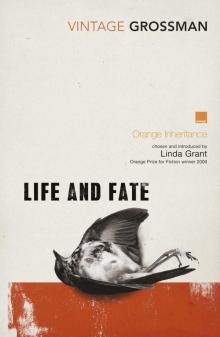 Life and Fate
Life and Fate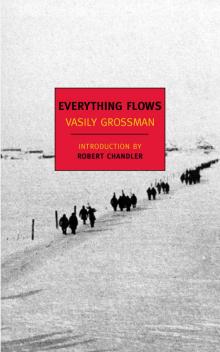 Everything Flows
Everything Flows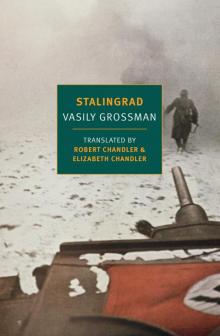 Stalingrad
Stalingrad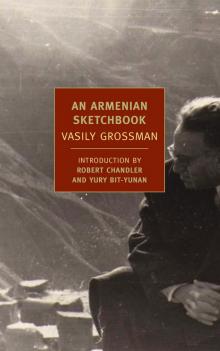 An Armenian Sketchbook
An Armenian Sketchbook The Road
The Road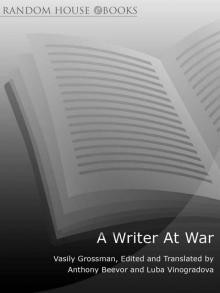 A Writer at War
A Writer at War